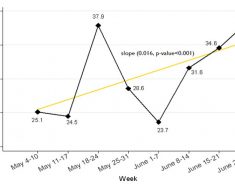If we want our kids to have a positive relationship with their bodies, and with food and movement, we need to start with ourselves.
Most parents we talk to want to know the secret tips and tricks are to improve their kids body image… and most parents don’t realise that their own thoughts and feelings about their own weight, appearance, and bodies, are the secret.
The shame around your body is negatively affecting your kid. Credit:iStock
It’s not always the answer they want to hear. They turn away a bit, look down, and mumble something about social media being such a bad influence – wishing that the thing they had to do was anything but what we are asking.
But the truth is that our own body image, our attitudes towards our body, weight, food, and movement, are the biggest influence on our kids. We learned about what bodies “should” look like, how we look after them (or not), and which bodies are valued from our parents, and our kids learn this from us. As they move towards adolescence, peers gradually take over, and yes, the media, and social media have an influence, but our potential impact as parents is still strong.
There’s a reason why we’re uncomfortable about this. We’ve had many years of messaging about what the ideal body looks like, a whole heap of stigma and discrimination around larger bodies, and damaging “health” promotion messaging and diet culture that has reinforced the idea that our bodies “should” look a certain way, at all costs – and we feel shame when we don’t.
We’ve had a lot of practice at hating our bodies. Thirty years (or more!) of wishing they were smaller, shorter, taller, broader, a bit more of this and a bit less of that. Always something other than what you have. And it’s cost us a lot. Relationships. Jobs. Careers. Time and energy. Making memories with our children. For many of us, feeling shame about our bodies literally stops us from living our lives. And we desperately want it to be different for our kids, and for the next generation.
“For many of us, feeling shame about our bodies literally stops us from living our lives.”
For a long time, there has been a misconception that we should make people, or make ourselves feel bad about our weight in order to motivate us to engage in health behaviour. The science is showing that this isn’t working. People think that if we appreciate our bodies, accept, and trust them, we would all be like “Norm” on the couch. They ask: “But is loving your body actually good for you?” The answer is Yes. When we appreciate our bodies, we look after them more by eating fruit and vegetables, and moving our bodies. Research has shown that people with more positive body image even wear sunscreen and engage in preventative cancer screening more often. It’s time we realised that shame doesn’t help people “be healthy”, it means that they avoid health care, experience poor quality of life, and gain weight over time, not lose it.
Feeling shame around our bodies hasn’t helped us to be healthy. It doesn’t motivate positive behaviour change. If we want people to be healthy, we need to focus on encouraging and facilitating health behaviours – not create shame around weight.
The one thing we can change for our kids is this sense of shame. We need to unpack our unconscious biases, shed our own years of shame. Stop doing things like weighing ourselves, going on diets, and complaining about our bodies with our friends. Stop saying things like: “I just need to lose 5 kilograms and I will be happy”. Stop believing that we need to hate our bodies into submission. We need to do this for us, and for our kids.
We know that we don’t want to pass this shame on to the next generation. It’s not worth it. And the change? It starts with you.
Dr Zali Yager is the Executive Director of the Body Confident Collective, and an Honorary Associate Professor at the Institute of Health and Sport at Victoria University. Her new book, Embrace Kids, co-authored with Taryn Brumfitt, is out now.
Make the most of your health, relationships, fitness and nutrition with our Live Well newsletter. Get it in your inbox every Monday.
Most Viewed in Lifestyle
From our partners
Source: Read Full Article






